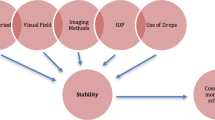Abstract
Purpose
To identify the key set of glaucoma surgery outcome measures considered most important and practical to collect by glaucoma specialists.
Methods
One hundred two glaucoma specialists (57 members of the UK and Eire Glaucoma Society (UKEGS) and 45 members of the European Glaucoma society (EGS)) took part in an Online Delphi exercise. The RAND/UCLA appropriateness method was used analyse data from each round and generate a disagreement index.
Results
Participants agreed on 13 baseline data points and 12 outcomes that were considered important and practical to collect. For intraocular pressure (IOP) percentage reduction in IOP from baseline (last three IOP readings pre-op) and reduction below a specified target were considered important. For visual fields, change in a global visual field index, e.g. MD, and development of progression as assessed by linear regression were considered important. From a safety perspective, any visual loss resulting in a doubling of the minimal angle of resolution, loss of 5 dB or more of visual field or development of advanced field loss (Hodapp Parrish Anderson Stage 4) was considered important. The importance of routinely using patient reported outcome measures (PROMs) was highlighted. Consensus suggested that outcomes of glaucoma treatments should be reported at 1, 5 and 10 years.
Conclusions
There was broad consensus on a minimum dataset for reporting the outcomes of glaucoma surgery and outcome measurement intervals.
Similar content being viewed by others
References
Ivers N, Jamtvedt G, Flottorp S, Young JM, Odgaard-Jensen J, French SD, et al. (2012) Audit and feedback: effects on professional practice and healthcare outcomes. Cochrane Database Syst Rev (6):CD000259
Porter ME (2010) What is value in health care? N Engl J Med 363(26):2477–2481
Rotchford AP, King AJ (2010) Moving the goal posts definitions of success after glaucoma surgery and their effect on reported outcome. Ophthalmology 117(1):18–23
Mahmud I, Kelley T, Stowell C, Haripriya A, Boman A, Kossler I et al (2015) A proposed minimum standard set of outcome measures for cataract surgery. JAMA Ophthalmol 133(11):1247
Fitch K (2001) The RAND/UCLA appropriateness method user’s manual. Rand Corp., Santa Monica
Ismail R, Azuara-Blanco A, Ramsay CR (2014) Variation of clinical outcomes used in glaucoma randomised controlled trials: a systematic review. Br J Ophthalmol 98(4):464–468
Ismail R, Azuara-Blanco A, Ramsay CR (2016) Consensus on outcome measures for glaucoma effectiveness trials. J Glaucoma 25(6):539–546
Jackson TL, Donachie PHJ, Johnston RL et al (2016) Interpreting database studies. JAMA Ophthalmol 134(1):86–87
Solano-Moncada F, Dymerska M, Jefferys JL, Quigley HA (2016) Adherence with the use of target intraocular pressure for glaucoma patients in a large university practice. J Glaucoma 25(4):e424–e432
Spaeth GL (1995) Proper outcome measurements regarding glaucoma: the inadequacy of using intraocular pressure alone. Eur J Ophthalmol 6(2):101–105
Tatham AJ, Medeiros FA (2017) Detecting structural progression in glaucoma with optical coherence tomography. Ophthalmology 124(12S):S57–S65
Acknowledgements
Thanks to UKEGS and EGS for providing access to their mailing lists, to all the consultants who took the time to fill out the questionnaire and to Professor Anja Tuulonen for critical reading of the manuscript and helpful suggestions. RF is a director and shareholder of Clinvivo Ltd., a University of Warwick spin-out company that provides services including design and administration of Delphi studies. These services were not used in this study and notwithstanding the disclosure, RF declares no conflicts of interest. None of the other authors has any competing financial interests in relation to the work described.
Author information
Authors and Affiliations
Corresponding author
Ethics declarations
Conflict of interest
Somner declares that he has no conflict of interest. Ismail declares that she has no conflict of interest. Azuara-Blanco declares that he has no conflict of interest. King has received honoraria from Allergan UK for lectures performed. Froud declares that he has no conflict of interest. He is a director and shareholder of Clinvivo Ltd., a University of Warwick spin-out company that provides services including design and administration of Delphi studies. These services were not used in this study.
Ethical approval
This article does not contain any studies with human participants performed by any of the authors.
Informed consent
Informed consent was not required for this survey.
Rights and permissions
About this article
Cite this article
Somner, J.E.A., Ismail, R., Froud, R. et al. Consensus generation of a minimum set of outcome measures for auditing glaucoma surgery outcomes—a Delphi exercise. Graefes Arch Clin Exp Ophthalmol 256, 2407–2411 (2018). https://doi.org/10.1007/s00417-018-4140-4
Received:
Revised:
Accepted:
Published:
Issue Date:
DOI: https://doi.org/10.1007/s00417-018-4140-4




